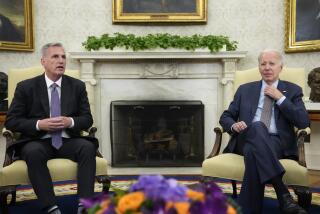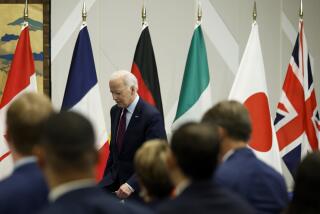Reagan Bends
- Share via
A President’s willingness to negotiate a budget compromise with Congress should not be an unusual thing. But that is in fact the case; President Reagan has refused to meet with Democratic congressional leaders on the deficit in recent years, and has repeatedly charged that deficits are the fault of Congress alone.
So it is that Reagan’s offer Tuesday to confer with Congress on the deficit should serve as a welcome signal that the White House now considers the stock market crisis serious enough to offer leadership on the issue. Just a few hours earlier, the President’s budget director said that Reagan was not in the mood for any economic summit meeting at this time. Publicly, the White House had been content to emphasize the strength of the American economy and to appeal for calm.
In the afternoon the President not only offered to meet with congressional leaders, he also said that he was willing to look at whatever proposals they might have. This was interpreted as an easing of his pledge to veto any tax increase, although the President later said that this was not what he intended.
The symbolism of a meeting between the President’s aides--and himself if necessary--and congressional leaders on the budget in the midst of the market crisis is important. But both the White House and Congress must be prepared to engage in more than symbolism. They must recognize the need--indeed, the urgency--for vigorous united action in the current economic crisis.
No one at this stage can pinpoint the instant causes of the market insanity, or prescribe a single sweeping cure. But there is no question that persistent massive budget and trade deficits have been major underlying factors in the behavior of the economy and the market. Now, finally, perhaps both the White House and Congress will see the necessity of dealing boldly with these twin evils.
More to Read
Get the L.A. Times Politics newsletter
Deeply reported insights into legislation, politics and policy from Sacramento, Washington and beyond. In your inbox twice per week.
You may occasionally receive promotional content from the Los Angeles Times.









